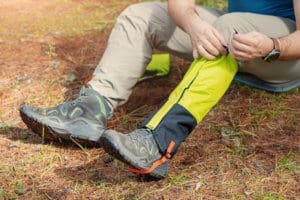You may be taking suitable precautions to protect yourself from bears and other wild animals while camping, but have you considered little pests that can be as small as the head of a needle? Ticks are one of the most troublesome issues in the wilderness because of their tiny size and power to transmit deadly diseases. For a long time, many people felt Oregon was mostly devoid of ticks, but they are becoming more prevalent throughout the state–some have even been found in neighborhood backyards. If you’re planning an outdoor retreat, here are some tips for avoiding ticks while camping.
 Easy Ways to Avoid Ticks:
Easy Ways to Avoid Ticks:
- Bring a tick-removal kit. Be prepared by making sure you know how to identify ticks and remove them safely. Ticks tend to move to warm parts of the body, including under arms and between legs. Read up on safe tick removal techniques and bring supplies with you in your first aid kit:
- Pointed tweezers
- Magnifying glass
- A lint roller
- Rubbing alcohol and antiseptic ointment
- Sealable plastic bag or jar
- Stay out of tall grass. Ticks love warm, moist environments such as long grass or debris piles. Avoid walking or camping in unmanicured or overgrown areas. If you must travel through an area like this, examine your pants and socks well for ticks.
- Choose a camping site ticks won’t like. Set up your camping spot in a dry, open area. Ticks don’t like bark mulch or dirt.
- Wear tick-proof clothing. It’s a good idea to wear clothes that cover your body well. Long sleeves and full pants will help keep ticks from latching onto your skin. Tuck pant legs into socks and boots to prevent them from getting under your clothing, or specialized gaiters over lower legs and ankles. Wrapping duct tape around your ankles and wrists will help keep them away, too.
- Use tick repellant. For your skin, use a repellent containing DEET. There are many options to choose from at your local drug store. However, you can also treat your clothing (not your skin) with permethrin. Permethrin is a tick repellent that kills ticks on contact. Its made for clothing, shoes, and camping gear. You may be able to find permethrin at your camping supply store.
- Shower well. If possible, take a shower regularly to wash off any loose bugs, including ticks, from your body. Examine your body well for the presence of ticks.
- Don’t forget your pets. If you’re bringing a dog with you on your camping trip, make sure you talk with your veterinarian about tick control medications and other preventative measures you should take. Check your pets every 2 to 3 hours for ticks in their fur. Do not use human tick repellents on animals.
- Heat your clothes when you return home. Immediately put all your camping clothes into the dryer for at least 10 minutes on high heat. Then, wash and dry them as usual. This initial heat will kill them before they can crawl out into your home.
Did you find this information about avoiding ticks while camping helpful?
The Jackson County Vector Control District (JCVCD) is your resource for education and solutions to reduce the risk to you, your family, and your neighbors related to disease-transmitting pests. Vectors are living organisms that can transmit diseases between humans or from other animals to humans. Oregon’s most common vectors include mosquitoes, flies, rats, and ticks.

 Easy Ways to Avoid Ticks:
Easy Ways to Avoid Ticks: